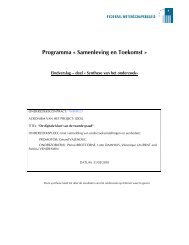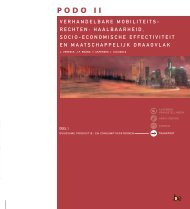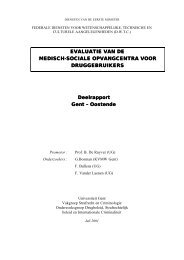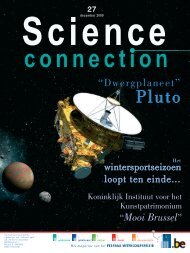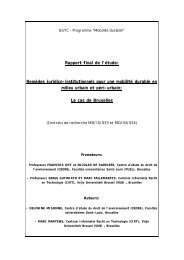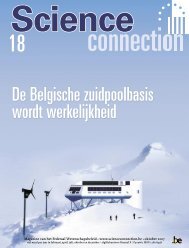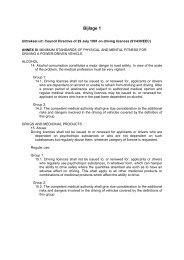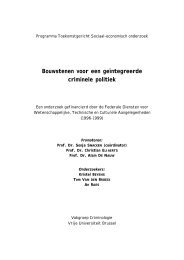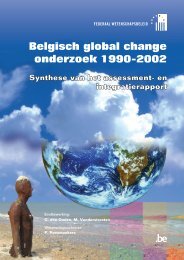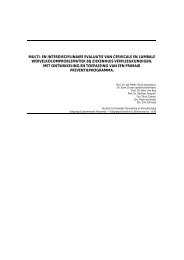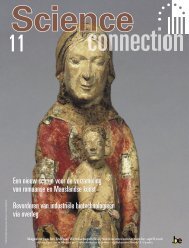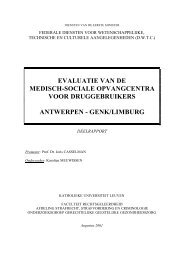chapter 3 inventory of local food systems
chapter 3 inventory of local food systems
chapter 3 inventory of local food systems
Create successful ePaper yourself
Turn your PDF publications into a flip-book with our unique Google optimized e-Paper software.
Project CP/59 - “Instruments and institutions to develop <strong>local</strong> <strong>food</strong> <strong>systems</strong>”<br />
5.2.4. Conclusions<br />
levers. Moreover, government should create the legal framework that does<br />
not hinder development. Some see a more far-reaching role for government,<br />
by giving <strong>local</strong> products priority in getting subsdies in the framework <strong>of</strong> the<br />
Common Agricultural Policy.<br />
Most participants found the innovative workshop method interesting and stimulating.<br />
Participants formulated the following suggestions:<br />
• More input as starting point for the café, in the form <strong>of</strong> more detailed<br />
presentations at the beginning;<br />
• More guidance throughout the dialogues. This refers both to the central theme <strong>of</strong><br />
the dialogues and to the ‘enforcement’ <strong>of</strong> basic cafe priniciples, such as to listen<br />
rather than to convince.<br />
From own observation, but also from some <strong>of</strong> the evaluations, we learned that an<br />
invitation to dialogue does not automatically lead to innovative insights and<br />
recommendations. Essential elements for a good dialogue include:<br />
• A good balance between advocacy (convincing) and informing (listening). High<br />
stakes <strong>of</strong> participants <strong>of</strong>ten lead to a domination <strong>of</strong> advocacy;<br />
• A diversity <strong>of</strong> perspectives. However, the further away people are from the<br />
problems discussed, the less their involvement. Nevertheless, diversity is<br />
necessary to really arrive at innovative insights and recommendations.<br />
We believe that we reached the aim <strong>of</strong> bringing people around the table to maximise<br />
their participation and voice, stimulating at the same time interaction between people<br />
that do not know each other. For future dialogues, important challenges are to increase<br />
the diversity <strong>of</strong> the participants and better facilitate the dialogue.<br />
5.3. Synthesis, conclusions and recommendations<br />
This research project had as central question how to further develop <strong>local</strong> <strong>food</strong> <strong>systems</strong>.<br />
The first part <strong>of</strong> the project looked into the identification, measurement and<br />
communication <strong>of</strong> indicators <strong>of</strong> sustainability that would appeal to the consumer and<br />
that is hence directed at the demand side <strong>of</strong> LFS. The second part <strong>of</strong> the project<br />
investigated the interior and exterior conditions for LFS to develop from the supply side.<br />
In our quest for a set <strong>of</strong> scientifically sound and practically usable indicators comparing<br />
the sustainability <strong>of</strong> <strong>local</strong> <strong>food</strong> <strong>systems</strong> with to mainstream <strong>food</strong> <strong>systems</strong>, we had to<br />
abandon our original plan to develop rich economic and ecological indicators. We did<br />
develop an ecological indicator depicting the energy use <strong>of</strong> different <strong>food</strong> <strong>systems</strong> taking<br />
a life cycle assessment approach. However, the calculation <strong>of</strong> economic indicators<br />
assessing the impact on employment and the multiplier effect <strong>of</strong> different <strong>systems</strong> has<br />
proven to be too difficult, primarily because <strong>of</strong> the heavy data requirements <strong>of</strong> these<br />
SPSD II - Part I - Sustainable production and consumption patterns - Agro-Food 73



